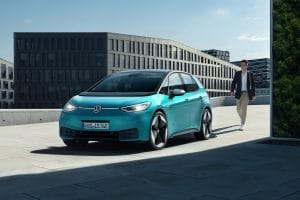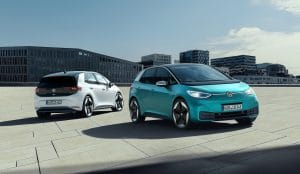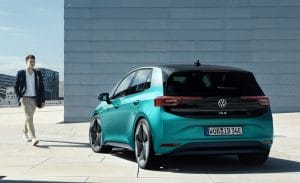
The ID.3 is the first production model to get Volkswagen’s new operating software designed to improve safety.
Volkswagen wants to rid the world of car accidents by 2050. The German automaker will introduce a new vehicle operating system later this year on the make’s new ID.3 EV to help make that happen.
“We want to have no more accidents by 2050,” said Michael Jost, the VW brand’s strategy chief.
The automaker’s next-generation cars will be equipped with the new software, sensors and processors to enable vehicles to anticipate and avoid accidents. The system also continues to learn over time, according to the automaker.
(It’s Official: ID Crozz Concept will reach U.S. market as the ID.4.)

The new ID.3 will come with three battery packs eventually with a range from 226 miles to 342 miles.
Jost noted that the new software-based vehicle operating system will be continually updated as software algorithms improve, according to Reuters.
“How quickly can data and algorithms improve? Our customers should benefit from deep learning every week, and every day. We are moving from being a device company to being a software company,” he said.
Volkswagen is still making adjustments to the system before its installed on the first generation of vehicles that will use it. The system will be on vehicles being sold this summer, said Thomas Ulbrich, the VW brand’s board member responsible for electromobility.
(Check out the all-new version of the VW Golf GTI.)
“We are not yet at 100%,” Ulbrich said about the status of the ID:3’s software development. “It is normal that there are still technical tasks to be done shortly before market launch.”
Volkswagen isn’t the first automaker to claim it’s operating system will continually learn and improve — Tesla’s been making the claim for a few years now. However, VW does have a major advantage over the Silicon Valley-funded EV maker: cost.
The ID.3 is expected to start at $27,000 after tax breaks and other incentives are factored into the price in Germany, Reuters reported, which is comparable to its gas- and diesel-powered vehicles, and forms part of a big expansion by the company in electric cars.
(Volkswagen updates Atlas SUV a year ahead of schedule.)
The VW brand expects to build 1.5 million electric cars by 2025.

